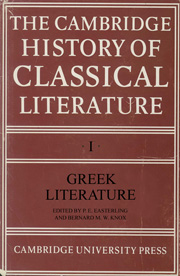Book contents
- Frontmatter
- 1 Books and readers in the Greek world
- 2 Homer
- 3 Hesiod
- 4 The epic tradition after Homer and Hesiod
- 5 Elegy and iambus
- 6 Archaic choral lyric
- 7 Monody
- 8 Choral lyric in the fifth century
- 9 Early Greek philosophy
- 10 Tragedy
- 11 The satyr play
- 12 Comedy
- 13 Historiography
- 14 Sophists and physicians of the Greek enlightenment
- 15 Plato and the Socratic work of Xenophon
- 16 Oratory
- 17 Aristotle
- 18 Hellenistic poetry
- 19 Post-Aristotelian philosophy
- 20 The literature of the Empire
- 21 Epilogue
- Appendix of authors and works
- Metrical appendix
- Works Cited in the Text
- References
10 - Tragedy
Published online by Cambridge University Press: 28 March 2008
- Frontmatter
- 1 Books and readers in the Greek world
- 2 Homer
- 3 Hesiod
- 4 The epic tradition after Homer and Hesiod
- 5 Elegy and iambus
- 6 Archaic choral lyric
- 7 Monody
- 8 Choral lyric in the fifth century
- 9 Early Greek philosophy
- 10 Tragedy
- 11 The satyr play
- 12 Comedy
- 13 Historiography
- 14 Sophists and physicians of the Greek enlightenment
- 15 Plato and the Socratic work of Xenophon
- 16 Oratory
- 17 Aristotle
- 18 Hellenistic poetry
- 19 Post-Aristotelian philosophy
- 20 The literature of the Empire
- 21 Epilogue
- Appendix of authors and works
- Metrical appendix
- Works Cited in the Text
- References
Summary
THE ORIGINS OF TRAGEDY
The documented history of Greek tragedy begins in 472 B.C. with Aeschylus' Persae. Of his earlier career we know little; we know something but not much about one or two of his contemporaries; we have a date (536/533) for the institution of a competition in tragedy at the Great Dionysia. The origins of tragedy lie in the sixth century. So complex, however, and so obscure is the evidence, so various are the theories advanced, that the hardened scholar approaches this subject with dismay.
The surviving plays of Aeschylus tell us what needs to be explained. There is a chorus, dramatized as the play demands. Their songs are elaborate and bulk large and, in pre-Aeschylean tragedy, may have bulked larger, since Aristotle informs us that Aeschylus reduced the choral element and ‘gave the leading role to the spoken word’. For the earlier plays two actors are required (either of whom could, with a change of mask and costume, take more than one part). Aeschylus is said himself to have added the second actor and either he or Sophocles the third, and Aeschylus uses three in his later plays. The actors deliver speeches, often of considerable length and formality, but also enter into dialogue with the coryphaeus (chorus-leader) or with the other actor. Particularly characteristic are passages of line-by-line interchange (stichomythia) which, like the narrative speech, remains a formal convention of tragedy as long as we know it and may well go back to its earliest beginnings. The plays (except Agamemnon) are of moderate length, rather over 1,000 lines. In what kind of performances did plays like these originate?
- Type
- Chapter
- Information
- The Cambridge History of Classical Literature , pp. 258 - 345Publisher: Cambridge University PressPrint publication year: 1985

